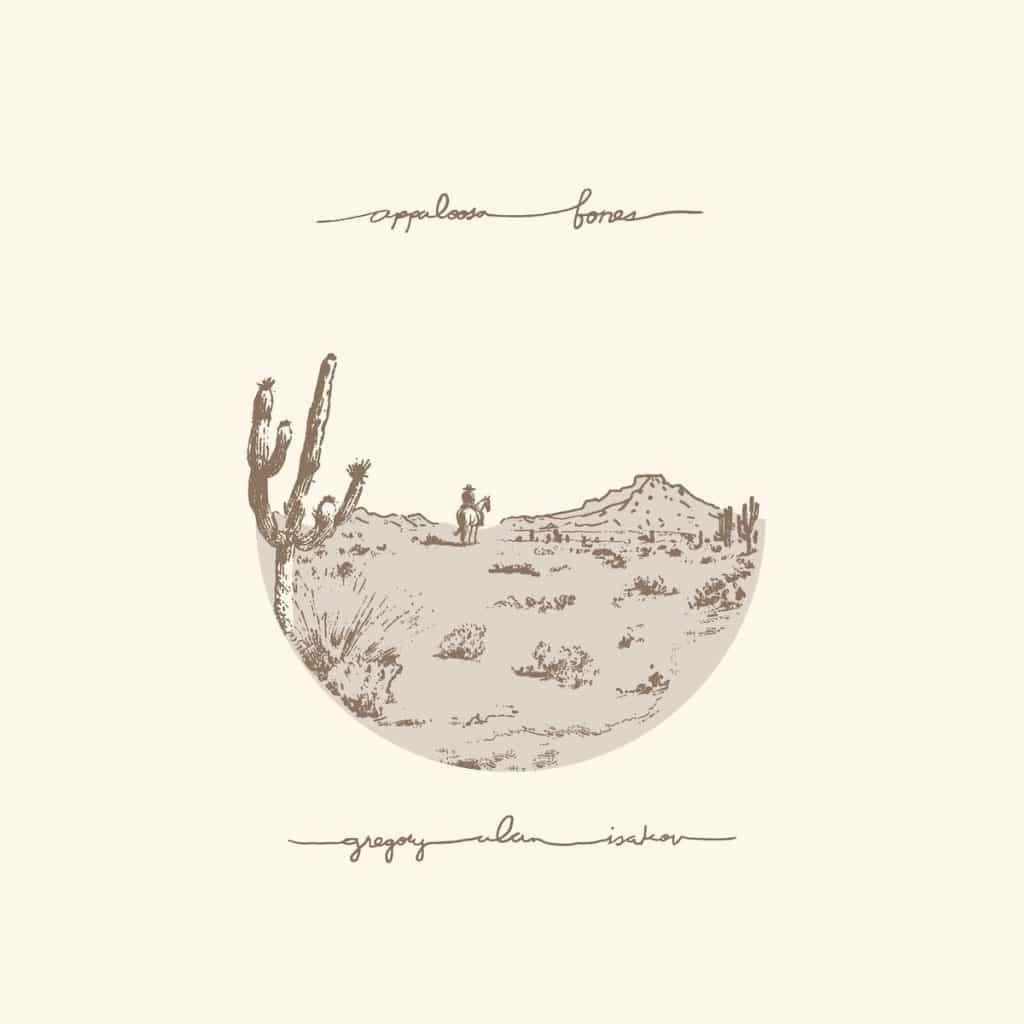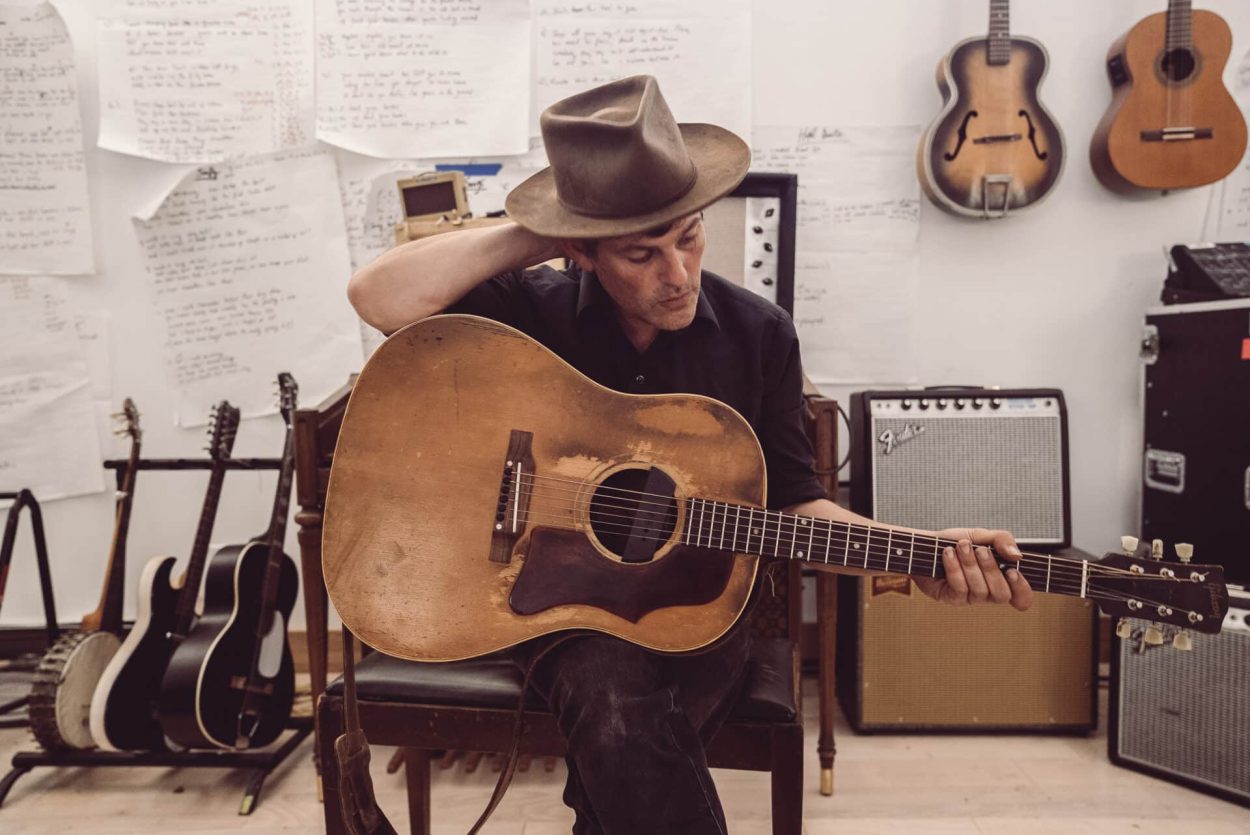On Appaloosa Bones, Gregory Alan Isakov crafts pop-up boom towns and misty villages, filling their thoroughfares and outskirts with denizens as at home in last night’s neon as they may have been in the moonlight of 150 years ago. Produced by Isakov and Andrew Berlin and featuring guest shots from Aoife O’Donovan as well as longtime collaborator Bonnie Paine (Elephant Revival), Appaloosa Bones benefits from waves of rolling keys as well as the Colorado-based singer-songwriter’s singular perception and always-stellar acoustic guitar tones.
Initially planned as a more austere pursuit in the same valley as 2018’s Evening Machines, Isakov ascends on tales born from earth, air, fire, and water that manifest like the seasons.
“A lot of my writing has these characters, this world where I write from where the land is a living thing and all of these elements are living things,” says Isakov while considering the album’s progression from dreamy indie to epic folk.
“Every time, I’m like, ‘I’m gonna make this kind o’ record,’ or I’ll hear a record that’s so inspiring, and I’ll be like, ‘Yes! I wanna make a record in that vein!’ And then the songs just tell you what to do, and they’re like, “Fuck you, I don’t care what you think! Now, we’re gonna make a super sleepy B-side record and you don’t have any say in it.’” laughs Isakov.
Recorded at Isakov’s home studio on his Starling Farm in Boulder County, Appaloosa Bones was partially completed through songs conceived over the course of decades and simply awaiting their fate.

“Songwriting is one of those things that I’ve never found to be evolutionary in any way. It’s not like you write a great song that works and now you’re good at it, and now you can write another song,” laughs Isakov. “You’re always trip reset every time– and that’s what I love about it. Time’s elusive and what you think is great, a little bit of time sitting on it will tell you the truth. I think that’s why it takes me so long. It’s not really the writing or the recording process– I do that pretty fast. I write a lot and it’s more just the time that I spend not listening, and then coming back and being like, ‘Alright, do I still feel something here?’”
The banjo and harmony-driven “Before The Sun” stretches back to Isakov in his early twenties.
“A lot of the songs on this record were kinda old songs– or at least the seeds of them were old. I changed the oil on ’em and took out the high school journal vibes, but I really wanted to honor some of the songs I just play all the time for myself. I didn’t know if anyone is gonna like this, but I wanted to just really take a look at all those, and [‘Before The Sun’] is one of the ones that made it. It was that gauge coming back, that gauge of like, ‘Do I still feel something? Oh, yeah! Yeah, I do! I guess this one’ll work!’”
With “Watchman”, Isakov offers up a tragic love story that evokes sepia-toned Appalachian murder ballads– though its inspiration arrived from far more immediate dangers.
“I run this farm full-time with two other people, and we have sheep. In the wintertime, when I’m home from tour, we have a major coyote problem. I hadn’t had fencing and stuff figured out for them yet, so I would just sit up all night with a flashlight on the really bad nights ’cause we kept losing lambs, so that song was originally the ‘coyote’ song! I wrote that in the middle of the night just sitting up listening to coyotes and running out there with this really heavy-duty flashlight! I think a lot of that made it into the song, but it turned out to be a song about how we’re always trying to fix things– relationships, systems, everything– and sometimes things that are just broken end up perfect.”
Considering the juxtaposition of his life as an artist (“I never dreamed I’d be doing this for my job,” he says) with his first passion for agriculture, Isakov freely embraces the obvious polarity.
“It’s a completely unnatural, bizarre lifestyle, playing music,” Isakov laughs. “You’re startin’ work when everyone’s goin’ to bed– it’s opposing on so many levels! I think the people that are doing it need to do it because it’s a humongous effort to conduct your life that way, especially trying to maintain relationships and trying to navigate your creative process and give yourself time to daydream and all of these things that are imperative to doing it. It’s a difficult path.”
But a path that’s still worth the occasional stumble. The album’s title track draws from Isakov’s early days as a performer.
“I was picturing just being completely at the end of yourself– like you have nothing left and something kinda carries you through it, and in the story, it’s a horse. We used to play this bar in Denver growing up called Appaloosa Grill, and it’s funny ’cause that’s kinda where the band and I– that was kinda like our rent gig! We played it, I don’t know– a hundred times a year or somethin’,” laughs Isakov, remembering. “We didn’t have enough songs– it was like a three-hour set– and we all had other jobs. I was farming and landscaping too, so I’d go after work, down to Denver, and it was like dinner and a few hundred bucks and we’d all split it. We had enough songs for the first set, and then we’d play some covers and then redo our first on the third set hoping there was enough turnaround that nobody would notice! After a year or two, we started having enough songs to fill the whole thing, and I think that period of time was so important to us as a band to learn how to relate to each other on stage and play music with each other and give the song space the way that we can. That was in the back of my mind with [‘Appaloosa Bones’]. That was the choice of that particular character.”
A contender for Song Of The Year, “Feed Your Horses” evokes Fred Eaglesmith’s diesel emotionalism, the “agricultural tragic” of Corb Lund, and the brittle but dedicated heart of Gary Stewart’s finest laments. The story of vulnerability and unrequited love is an album highlight buoyed by a lush ambiance that nevertheless recalls Isakov’s original leaner inclination.
“I just love old country songs. They’re fun to write, and that one in particular, I wrote back when I was recording with Brandi Carlile. I went out to Seattle to get her vocals on my record This Empty Northern Hemisphere, and she was like, ‘Gregory, I’ll come back, but I’ve got interviews all day,” and she had just put out The Story, I think, one of her bigger records, so I was just hangin’ out at her property. She was like, ‘Can you just feed the horses while I’m gone?’ So I was like, ‘That’s such a country song’ I was in her barn with a bunch of old guitars, and I was like, ‘Okay, yeah, that’s what I’m doin’ today!’”
